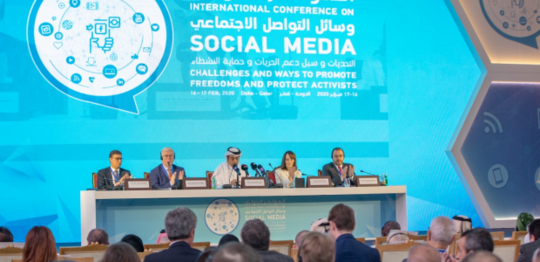The Conference on Social media challenges and ways to promote freedoms and protect activists brought together over 300 participants across the globe including journalists and their unions' leaders, think tanks, human rights activists, NGOs and international organisations.
The conference included speeches from prominent human rights, press freedom advocates, UN Special Rapporteurs, and experts on anti-terrorism and international law as well as IFJ unions' leaders.
Two days of fruitful debates
Discussions highlighted the need to hold online platforms responsible for tracking down hate speech. A high number of speakers and participants called for an end to the criminalisation of defamation and fake news as a tool to curb freedom of expression.
Pointing at the number of activists in jail in the region, discussions warned against anti-terror laws that are used as a weapon to jail activists and journalists across the globe, the importance to define terrorism and the threats such laws represented for freedom of expression.
A specific highlight was put on the need to reinforce privacy laws and encourage journalists to secure their digital safety and use encryption and tools to protect their messaging and sources.
Participants said that social media companies must explore all legal options before accepting requests that are excessively intrusive such as requests for shutdowns, and in the case of implementing then they should disclose all relevant and publishable information and provide regular updates about the services affected or restored, among other demands.
UNI Global General Secretary Christy Hoffman highlighted the role of social media in the wake of social protests and pointed at the Internet shutdowns as a tool to curb revolutions. She stressed the importance to break up tech giants.
Gender-based violence and harassment of minority groups online were specifically denounced throughout the conference ending with a strong message to speak up against those who are the target of online abuse.
In the final recommendation, the IFJ highlighted the importance of implementing global journalism standards, including the IFJ Global Charter of Ethics for Journalists.
IFJ President Youness MJahed said: "These technologies have contributed to the development of the democratic struggle, especially in countries where there is no free press, but political, human rights and activists are subject to harassment and persecution, which requires more commitment and means for their protection. This issue must be considered vital and a priority for all human rights defenders, in particular journalists' unions. It is necessary to underline the need to protect the right to freedom of expression as a fundamental human right. We are obliged, as journalists, activists and leaders of organisations, to be aware of the extreme importance of the issue of collateral damage of modern communication technologies. And for this to happen, quality press must play its pioneering role, providing a credible service to citizens. Moreover, we cannot accept the use of collateral damage as a justification that allows some governments to restrict freedoms or to adopt restrictive policies. "
The two-day conference was organised by the IFJ together with the European Parliament, the United Nations High Commissioner for Refugees (UNHCR), the National Human Rights Committee of Qatar (NHRC), the Global Alliance of National Human Rights Institutions (GANHRI).

